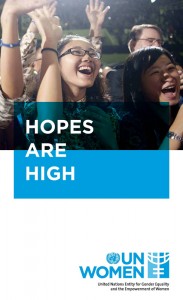
On July 2, 2010, the United Nations General Assembly voted unanimously to create a new gender entity, led by an Under-Secretary-General, that pulls together four previously distinct parts of the UN system dedicated to women’s advancement: UNIFEM, UNDAW, INSTRAW, and the Office of the Special Adviser on Gender Issues and Advancement of Women. This new gender architecture puts UN Women (ONU Femmes) on equal footing with the top issues considered by the UN—other such entities, under the political leadership of an Under-Secretary-General, include Economics and Trade, Development and Human Rights.
Reconstituting the four agencies into one single entity will, member states hope, provide the United Nations with more clout in addressing women’s issues. The key roles of UN Women will be to support inter-governmental bodies, such as the Commission on the Status of Women, in their formulation of policies, global standards and norms, and to help member states to implement these standards, standing ready to provide suitable technical and financial support to those countries that request it, as well as forging effective partnerships with civil society. It will also help the UN system to be accountable for its own commitments on gender equality, including regular monitoring of system-wide progress.
 It took four years to negotiate the final text for the creation of UN Women, in part because of resistance among some member states to the very idea that women needed their own United Nations organization. The progress made by consolidating the agencies and establishing UN Women is largely owing to Secretary-General Ban Ki-Moon’s leadership and commitment to giving women’s issues top priority and equal footing with other UN issues: “I have made gender equality and the empowerment of women one of my top priorities—from working to end the scourge of violence against women, to appointing more women to senior positions, to efforts to reduce maternal mortality rates.”
It took four years to negotiate the final text for the creation of UN Women, in part because of resistance among some member states to the very idea that women needed their own United Nations organization. The progress made by consolidating the agencies and establishing UN Women is largely owing to Secretary-General Ban Ki-Moon’s leadership and commitment to giving women’s issues top priority and equal footing with other UN issues: “I have made gender equality and the empowerment of women one of my top priorities—from working to end the scourge of violence against women, to appointing more women to senior positions, to efforts to reduce maternal mortality rates.”
The Under-Secretary-General is expected to be appointed in September and is likely to be a figure from the global south. UN Women will be fully operational by January 2011.
In the words of Deputy Secretary-General Asha-Rose Migiro: “UN Women will give women and girls the strong, unified voice they deserve on the world stage. I look forward to seeing this new entity up and running so that we—women and men—can move forward together in our endeavor to achieve the goals of equality, development and peace for all women and girls, everywhere.”
© Women’s WorldWide Web 2010













